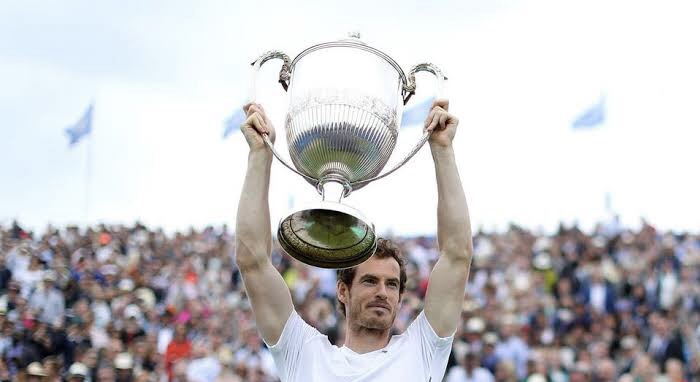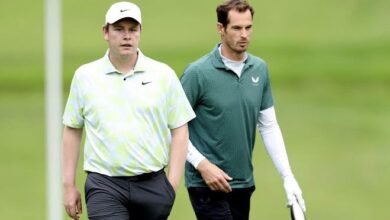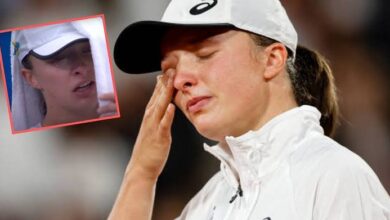Top 5 Murray’s most memorable on-court moments

Former World No. 1 lifted 46 tour-level titles in 20-year pro career. There was rarely a dull moment when Andy Murray stepped onto a tennis court.
The Briton will be remembered as one of the most resilient and defiant fighters the ATP Tour has ever seen. A natural competitor who also possessed one of the most effective counter-punching games in the world, the emotions Murray conveyed as he played encouraged millions of fans to live every shot, every rally, and every match with him.
To celebrate the end of his esteemed career, ATPTour.com looks back on 10 of Murray’s most memorable on-court moments.
1. San Jose, 2006: Teenage Murray beats former No. 1s for first Tour title
Murray announced himself as one of the world’s most promising teenagers in 2005. He reached the third round at both the Queen’s Club and Wimbledon, his second and third tour-level events, respectively, before reaching his first ATP Tour final later that year in Bangkok, where he fell to World No. 1 Roger Federer.
Despite starting 2006, his first full season on the ATP Tour, with just two wins in his first six matches, Murray soon gave a reminder of his potential with a milestone performance in February at an indoor ATP 250 event in San Jose, California. The then-18-year-old beat Andy Roddick and Lleyton Hewitt, both Grand Slam champions and former World No. 1s, back-to-back to clinch his maiden ATP Tour trophy.
“Obviously I was pretty happy,” said Murray, who remains the youngest Briton to win a tour-level singles title, when asked about his reaction on championship point. “I was probably in a bit more shock when I won against Roddick, to be honest, because it was my first win against somebody of that standard. Then I had a little bit more confidence going into the final.”
2. Cincinnati, 2008: Masters 1000 breakthrough
Murray had reached four ATP Masters 1000 semi-finals but was made to wait until August 2008 for his first championship-match appearance at that level. After beating Ivo Karlovic in the last four at the Cincinnati Open, the Scot did not let his chance go to waste as he overcame his rival Novak Djokovic in a pair of tie-breaks to claim the biggest title of his career at that point.
“It’s huge to win your first sort of major tournament, and to do it in a match like today makes it more special,” reflected Murray after his 7-6(4), 7-6(5) triumph. “I’ve been in semi-finals four times before this week and lost every time against tough players. This week I played well the whole week… I put in a lot of work off the court to be able to win these sorts of tournaments, and it makes it all worthwhile.”
It was the first of 14 Masters 1000 titles for Murray, a tally which places him fifth on the all-time list behind only Djokovic, Rafael Nadal, Federer and Andre Agassi. He won the title at seven of the nine Masters 1000 tournaments, with only the BNP Paribas Open in Indian Wells and the Rolex Monte-Carlo Masters missing from his resume.
3. London Olympics, 2012: Mastering Federer on grass
London 2012 offered Murray the rarest of opportunities — to compete at a home Olympics in the prime of his career — and the then-World No. 4 grabbed it with both hands on the lawns of the All England Club. The 25-year-old dropped just two sets across six matches as he charged to the Olympic title in style.
The scenes were in stark contrast to those at the same venue just over a month earlier, when Murray had fallen agonisingly short of Wimbledon glory with a four-set final defeat to Federer. Murray’s tears during his runner’s up speech that day only endeared him further to a British public desperate for an end to its 35-year wait for a Grand Slam singles champion.
Murray appeared to have all-but-forgotten that disappointment by the time the Olympics came around. In the best-of-five-sets gold medal match, Murray dismantled Federer, by then already a seven-time Wimbledon champion, 6-2, 6-1, 6-4. He hammered an ace down the T on match point to complete a remarkable victory and send the Centre Court crowd into raptures.
“You see how much it means to all of the athletes when they do it, how much work goes into it,” said Murray, who later defended his title in Rio de Janeiro in 2016 to become the only player with two men’s singles Olympic gold medals, after his emotional win in London. “The atmosphere in all of the stadiums, when everyone’s won gold medals in all of the sports, everyone’s just been so happy and pumped. I’m just glad I’ve been able to contribute to that.”
4. US Open, 2012: Murray’s maiden major
The US Open was the setting for Murray’s first Grand Slam final appearance. He fell to Federer in the 2008 final, a loss that began four years of heartache that included three championship-match losses and six semi-final defeats at the majors.
It was also at Flushing Meadows where Murray, a man long dubbed by many as ‘too good not to win a major’, finally got over the line on the biggest stage. The addition of ATP Tour great Ivan Lendl to his team at the start of 2012 appeared to have installed an extra mental edge in the Briton, and that was on full display as he outlasted Djokovic for an epic 7-6(10), 7-5, 2-6, 3-6, 6-2 victory across four hours and 54 minutes in New York.
“I was obviously very emotional. I cried a little bit on the court,” said Murray when asked what winning a Grand Slam had felt like. “You’re not sad, you’re incredibly happy. You’re in a little bit of disbelief, because when I have been in that position many times before and not won, you do think, is it ever going to happen? Then when it finally does, you’re obviously very, very excited. [I’m] mainly relieved to have got over that, that last hurdle.”
Murray was the first British major winner since Virigina Wade at Wimbledon in 1977 and the first men’s singles winner from his country since Fred Perry won the US Open 76 years earlier in 1936. The Scot never made the championship match in New York again but remained a consistent performer at the Slams — his 11 finals were spread across all four majors, including five at the Australian Open.
5. Wimbledon, 2013: Breaking Britain’s duck
An entire nation was glued to its TV screens on a sunny July afternoon in 2013 as Murray finally ended Britain’s 77-year wait for a Wimbledon men’s singles champion. He did it with a 6-4, 7-5, 6-4 victory against World No. 1 Djokovic, although what was ultimately a commanding straight-sets win may have felt more like a trademark Murray nailbiter for many home fans.
Djokovic reeled off four games in a row from 0-2 in the third set, before Murray responded with a four-game streak of his own to close out his win. Djokovic netted a backhand on the Briton’s fourth championship point to send Centre Court into ecstasy and immediately etch Murray’s name into British sporting folklore. Some of Murray’s post-match words reflected the sheer scale of expectation he had met by becoming a home champion at the grass-court Grand Slam.
“For the past four or five years, it’s been very, very tough, very stressful, a lot of pressure,” said Murray. “ It’s just kind of everywhere you go. It’s so hard to avoid everything because of how big this event is, but also because of the history and no Brit having won. I think now it will become easier.”
Three years later, Murray certainly made it appear so. He dropped just two sets the entire fortnight as he overcame Milos Raonic for the 2016 title at the All England Club, where he ultimately finished his career with a 61-13 singles record.



